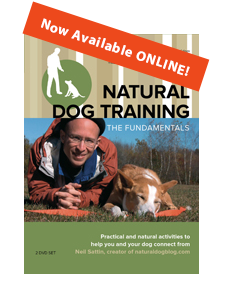Socialization, socialization, socialization. These days we're told that the key to having a dog that gets along with all other dogs and people is to make sure that you give the dog a daily dose of socialization. Dogparks have sprung up around the country, giving dog owners a place to let their dogs meet-and-greet off-leash, chase balls together, and, essentially, go crazy - as long as no one gets too crazy. It always happens, though - one dog gets a little too close to another dog's ball/owner/preferred-spot-of-dirt, and then the sparks fly. Then I typically get a call from a distraught owner (in recovery from the scorn of the other dog-parkers), wondering why their dog is so aggressive, and hoping that there's something they can do to solve the problem. In this article I'm going to discuss an alternative to the dog park that will give you the "socialization" that you're after in a way that's much more controllable and likely to lead to positive outcomes.
Now don't get me wrong: socialization is important. It's socialization for socialization's sake that can have undesired consequences for your dog. What you have to remember is that your dog is naturally social when involved in the activity for which they were designed by nature: hunting - or any activity that gives dogs a common purpose around which to unite. A bunch of dogs gathered at the dog park, however, are much like the kids in an empty, fenced-in backyard that I described in my article on being the moose - primed for dysfunction! Anti-social behavior occurs because there is a bunch of energy in the system, but there is no place for it to really go - it gets stored as stress until one dog or another just can't take it anymore. That's the dog park in a nutshell. Even the rock solid dogs who do great at the dog park, and who seem to be having a blast romping from one playmate to the next, those dogs would find engaging their prey instincts to be much more fulfilling. Engaging in your prey drive with another dog or two - now that's fulfilling AND social behavior.
If you have a dog who is rock solid - great, do whatever you want! Seriously. However, let's say you have a dog who's "iffy" with other dogs. Not exactly aggressive, but not all that excited to play, either. Clearly there's something going on around other dogs that you want to address, and "more socialization" would be the common prescription for their cure. How can you give your dog positive experiences with other dogs, especially dogs unknown to them, so that they get to a place where they're relaxed and playful in the presence of other canines?
If socialization is even a concern for you, then I'm going to assume that you're in a place where there are other dogs around, or that you can get to such a place somewhat easily. What you want to do is find someplace to walk with your dog (i.e. your dog is ON leash) where you know there will be other dogs around, preferably other dogs that are also on leash. Like, for instance, just walking around a neighborhood at a time when you're likely to encounter other people who are out walking with their dogs.
Typically when you're out on a walk with your dog and you encounter another person with a dog, the interaction will go something like this:
Them: "Is your dog friendly?"
You: "Uh, sure!"
Dogs: Sniff, sniff...then maybe growl, bark (or play bow)
Owners (laughing): "*insert something chit-chatty here followed by 'Goodbye'*"
And everyone goes on their merry way. Not very satisfying - especially for the dogs. In fact, these encounters tend to just create stress that'll get saved up for the next dog-to-dog interaction.
So here's what I suggest: Next time you come across another dog-walkin' person, take charge of the situation. Ask them if their dog is friendly (just to make sure that no one is going to get bitten), and then ask if they would mind if you walked with them for a few minutes. Almost always the other person will agree. You can give the two dogs a moment or two to sniff each other, but then KEEP IT MOVING. I refer you here to my article on how to introduce two dogs to each other, and you can follow those steps to make sure that the interaction is positive for both dogs.
Once you're walking along, your dogs are actually on the hunt together. United in their common purpose (the walk), they will be able to communicate with each other and work out the stress of encountering a new dog. Play isn't necessary between the two dogs, but if they do clearly want to play you might want to let them have a moment or two. Ultimately what you REALLY want to do, however, is to finish off the encounter by just playing some tug-of-war with your dog (or doing some pushing) as the other dog and owner walk away. That will help release any of your dog's stress that might be left over from the meeting. And any of your stress, for that matter! Of course, another benefit of taking this time to walk with another person is that you'll actually have the chance to have a real conversation as you walk together. I've noticed that personally my interactions with other dog owners has improved tremendously as we get to know each other on these little walks together, as opposed to the dog park, where I rarely seemed to get beyond the "what kind of dog is your dog" and similar surface-level conversations. There's something about the common purpose of the walk that allows everyone's true nature to shine through.
Overall, you're going to be achieving the true purpose of socialization: allowing your dog to experience the FEELING of what it's like to relax around a strange dog, and to communicate successfully with another dog. The more that you have these walks, the more relaxed around other dogs, in general, your dog will be. Plus, by playing tug or pushing with your dog at various points throughout the encounter, you will help reinforce for your dog that YOU are the ultimate answer for the question of "what do I do with my energy?" - even the energy of meeting another dog. Perhaps you and your dog will eventually get some off- leash playdates with one of these newfound friends, if that's ultimately what you're after. An occasional trip to the dog park might then be an option for you, if you want - but I think that you'll come to enjoy this more purposeful approach to socialization and find it to be much more satisfying than the chaos and uncertainty of the dog park for both you and your dog.





Fantastic advice, Neil!